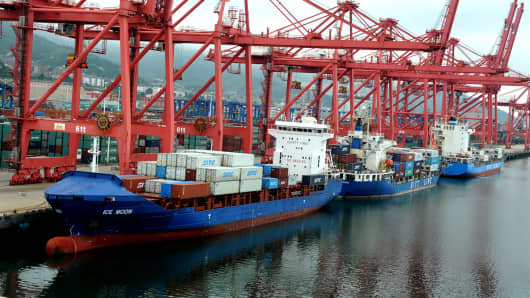The shipping industry might be suffering a tough period of overcapacity but chief executive of oil and shipping giant, Moller-Maersk, told CNBC that his company was prepared to weather the storm to defend its 15 percent share of the global container shipping market.
“We don’t want other companies to leapfrog us and to be more aggressive on investments, so we are going to defend our market-leading position and that means we will expect to grow a little bit ahead of the market in most years,” Nils S. Andersen told CNBC this week.
Andersen conceded that the shipping industry environment was currently “pretty difficult,” however. Of late, the shipping industry has been dogged by overcapacity — following a boom in ship orders that coincided with the economic downturn — and the subsequent decline in freight rates.
Its latest second quarter financial results released in August, Maersk Line’s net profit had fallen 7.3 percent year-on-year, to $507 million (from $547 million) on the back of falling freight rates – what it called “deteriorating market conditions” — on the Asia-Europe trade.

ChinaFotoPress | Getty Images
Container ships are seen at Lianyungang port on July 10, 2015 in Lianyungang, Jiangsu Province of China. During the first six months of 2015, total value of foreign trade stood at about 1857.48 billion USD (11.53 trillion RMB), down by 6.9 percent from a year earlier.
Danish company Maersk is seen something of a bellwether of global trade as it accounts for 15 percent of the world’s container shipping capacity. Andersen explained the problems facing the industry.
“I think the most, the most factor right now is the overcapacity situation and that overcapacity situation is particularly pronounced in the Asia/Europe regions – which happens to be our most important trade lane.”
“So we have a lot of pressure in that business, we have had pressure for a long time, for many years so there is nothing new in that and we also believe that the industry has to be able to live with overcapacity,” he said.
Andersen believed that the problem of overcapacity might be added to by the new delivery of ships equating to 9 percent of the total global fleet. “Trade is only growing somewhere between 2 percent so over capacity is increasing,” he said.
Before the economic crisis dampened the demand for goods, container shipping companies enjoyed a growth in demand for containers of more than 10 percent a year. Andersen said any expectations of a return to demand growth of those levels “is now gone.”
“We’ve adjusted our forecast (for container shipping demand) down to between 3 to 5 percent. I think in the short term, I think it’s probably going to be more around 2 percent this year and between 2 to 4 percent next year. So we have to be much more realistic on that.”
Source: CBNC
Source: CBNC

